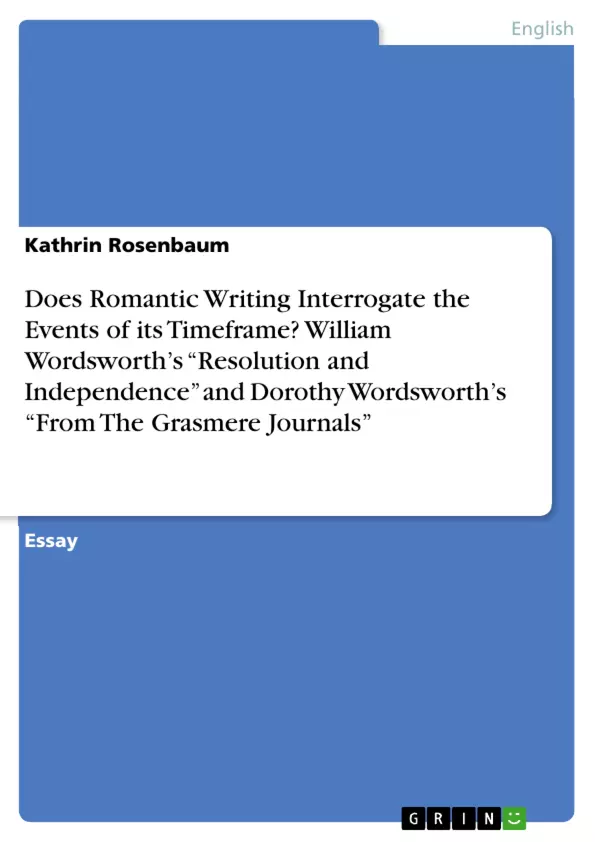The Romantic age, stretching from 1785 to 1830, can arguably be regarded as a turbulent period, rife with historical, political and cultural upheavals. Not surprisingly, echoes of these momentous events can often be found in Romantic Writing, such as in Blake’s “A Song of Liberty”, which interrogates the French Revolution.
For England, however, it was probably the Industrial Revolution with its countless social and labour-related repercussions that played the most pivotal role. Urban manufacturing centres transformed the primarily agricultural society into a modern industrial nation. The mechanization of the working processes, numerous enclosure acts, and resultant unemployment of agricultural labourers, led to a population drift to cities as well as rural pauperization. The end result: three million labouring poor with low incomes from 6 to 15 pounds a year made up the largest section of the British population.
Inhaltsverzeichnis (Table of Contents)
- Romantic Writing Interrogates the Historical, Political and Cultural Events of its Timeframe
- The Problem of Rural Poverty and Displacement
- The Authors' Presentation of Pauperization and Its Effects on the Reader
- The Authors' Feelings and Motives for Interrogating Social Poverty
- The Importance of the Leech Gatherer and the Poor Women Vagrants
Zielsetzung und Themenschwerpunkte (Objectives and Key Themes)
This essay examines the representation of rural poverty and displacement in Romantic writing by analyzing William Wordsworth's "Resolution and Independence" and Dorothy Wordsworth's "From the Grasmere Journals." The text argues that the siblings, despite their contrasting styles, both engage with the social problem of poverty, albeit in different ways.
- The influence of the Industrial Revolution on rural poverty and displacement.
- The representation of impoverished individuals in Romantic literature.
- The authors' personal experiences and perspectives on poverty.
- The concept of literary identification and its role in understanding the authors' work.
- The contrasting styles of William and Dorothy Wordsworth in depicting social conditions.
Zusammenfassung der Kapitel (Chapter Summaries)
The first section examines how the authors present pauperization and its impact on the reader. Dorothy Wordsworth, through her journal entries, portrays a stark and realistic picture of poverty, presenting a range of indigents and their stories in an unadorned manner. In contrast, William Wordsworth focuses on one individual pauper, the leech gatherer, who becomes a symbolic figure in his poem.
The second section explores the authors' feelings and motivations for interrogating social poverty. Both William and Dorothy, though not wealthy, were fortunate enough to live comfortable lives in Grasmere. Their writings reflect a sense of gratitude for their position, while also acknowledging the hardship faced by the impoverished. William's "Resolution and Independence" suggests that he identifies with the anxieties of a young poet facing a precarious future, and the leech gatherer becomes a representation of societal change and its consequences.
The third section delves into the importance of the leech gatherer and the poor women vagrants in the authors' work. The leech gatherer, a real-life individual encountered by the siblings, is portrayed differently by each author. Dorothy presents him as a feeble-bodied beggar, while William depicts him as a stout-hearted figure refusing to rely on charity. This divergence in portrayal reflects their differing perspectives on poverty and their individual artistic choices.
Schlüsselwörter (Keywords)
Key terms and concepts explored in this text include Romantic writing, rural poverty, displacement, social conditions, Industrial Revolution, leech gatherer, literary identification, William Wordsworth, Dorothy Wordsworth, "Resolution and Independence," "From the Grasmere Journals," and the concept of 'common life' in Romantic literature.
Frequently Asked Questions
How does Romantic writing address the social issues of its time?
Romantic writing often interrogates momentous historical and political events, such as the French Revolution and the Industrial Revolution, by focusing on their impact on common life and individuals.
What caused rural poverty during the Romantic age?
The Industrial Revolution, mechanization of labor, and numerous enclosure acts led to widespread unemployment among agricultural laborers, rural pauperization, and a population drift to cities.
How do William and Dorothy Wordsworth differ in their portrayal of poverty?
Dorothy provides stark, realistic, and unadorned accounts in her journals, while William uses symbolic figures like the 'leech gatherer' to explore deeper philosophical and personal anxieties.
Who is the 'leech gatherer' in Wordsworth's poetry?
The leech gatherer is a real-life impoverished figure encountered by the siblings. In William's poem "Resolution and Independence," he represents resilience and the consequences of societal change.
What is 'literary identification' in this context?
It refers to how William Wordsworth identifies his own anxieties as a young poet with the hardships faced by the poor, using their stories to reflect on his own precarious future.
- Quote paper
- Kathrin Rosenbaum (Author), 2008, Does Romantic Writing Interrogate the Events of its Timeframe? William Wordsworth’s “Resolution and Independence” and Dorothy Wordsworth’s “From The Grasmere Journals”, Munich, GRIN Verlag, https://www.grin.com/document/310539



